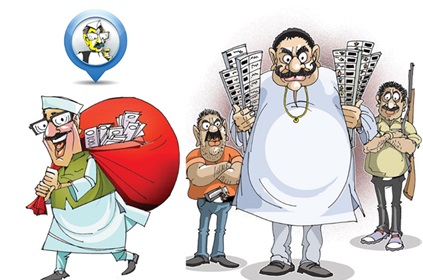Prelims: Indian Political System
Mains: General Studies Paper 2 (Main features of the Representation of the People Act; Parliament and State Legislatures- structure, functions, functioning, powers and privileges and issues arising out of these) |
Reference:
In the context of the ever-increasing role of criminals in politics at present, a report has been issued by the Supreme Court on the criminalization of politics. Also, in a public interest litigation, the Supreme Court has sought answers from the Central Government and the Election Commission on the re-election of a convicted person to the Parliament or Assembly.

Recent Report on Criminalization of Politics:
- According to this report of the Supreme Court, out of 543 Lok Sabha MPs, 251 (46%) have criminal cases registered against them.
- Out of these, 170 MPs are accused of such serious crimes which can lead to imprisonment of 5 years or more.
State-wise situation:
- Out of 20 MPs of Kerala, 19 (95%) have criminal cases registered against them. Of these, 11 MPs have serious cases registered against them.
- 14 out of 17 MPs from Telangana (82%), 16 out of 21 MPs from Odisha (76%), 10 out of 14 MPs from Jharkhand (71%), and 26 out of 39 MPs from Tamil Nadu (67%) have criminal cases registered against them.
- Even in big states like Uttar Pradesh, Maharashtra, West Bengal, Bihar, Karnataka and Andhra Pradesh, around 50% of the MPs are facing criminal cases.
- Only one MP each in Haryana (10 MPs) and Chhattisgarh (11 MPs) have criminal cases registered against them.
- 2 out of 13 MPs in Punjab, 3 out of 14 in Assam, 3 out of 7 in Delhi, 4 out of 25 in Rajasthan, 5 out of 25 in Gujarat, and 9 out of 29 MPs in Madhya Pradesh have criminal cases registered against them.
Directions for reform by the Supreme Court:
- In the case of Association for Democratic Reforms vs Union of India (2002), the Supreme Court directed every candidate contesting elections to Parliament or State Legislature to declare his criminal background and assets etc.
- In the Lily Thomas case (2013), the Supreme Court said that accused Members of Parliament and MLAs, if convicted of crimes, will be immediately disqualified from the membership of the House without giving three months time for appeal.
- In March 2014, the Supreme Court accepted the recommendations of the Law Commission and passed an order directing that the trial against the sitting MPs and MLAs should be completed within one year of framing of charges.
- In the case of Rambabu Singh Thakur vs Sunil Thakur (2019), the Supreme Court directed that all political parties should publish the details of the criminal history of their candidates while filing nominations.
- In the case of Public Interest Foundation vs Union of India (2019), the Supreme Court of India ordered political parties to publish the criminal records of their candidates on their websites, social media handles and newspapers.
- The Supreme Court had directed all High Courts to constitute a special bench in the year 2023 to monitor the trial of pending criminal cases against sitting and former MLAs.
- But many states have not yet set up such special courts. Due to this, the trial of such cases in some states is pending for more than two decades.
- As of January 1, 2025, there are 4,732 criminal cases pending against sitting or former MLAs.
Effect of increasing criminalization in politics:
- Politicization of bureaucracy
- Possibility of manipulation of election results
- Decline in political values
- Governance moving towards corruption
- Rights and freedoms of citizens limited
- People's faith in democracy declining
- Decline in democratic institutions
What is the recent case filed in the Supreme Court:
- Related case: Ashwini Kumar Upadhyay vs Union of India (2025)
- A PIL was filed in the Supreme Court in this case, which raised major issues to stop the criminalization of politics.
- Major issues raised in the PIL
- Quick disposal of cases of MPs/MLAs
- Consideration of constitutional validity of Section 8 and 9 of the Representation of the People Act
- The petition has sought a lifetime ban on convicted politicians.
- Can a person convicted of a criminal offence form a political party, or be an office bearer of a political party?
Conflict of interest:
- If a convicted or convicted person participates in the law-making process by being elected as a Member of Parliament or Legislative Assembly, then it is clearly a conflict of interest.
- That is, those who are not following the law, the same people are also doing the work of law and policy making.
Government's opinion:
- In an affidavit filed in the Supreme Court by the Ministry of Law and Justice in December 2020, the government rejected the idea of imposing a lifetime ban on convicted persons from contesting elections, or forming a political party or becoming its office bearer.
- This opinion was reiterated by the Central Government even in the year 2024.
|
Also know
Representation of the People Act, 1951
- Section 8: This section describes the specific offenses in which a public representative is disqualified on conviction and he is disqualified from participating in elections for an additional period of six years from the date of conviction and imprisonment after his release.
- Section 9: Under this section, a person removed from office on grounds of corruption or disloyalty to the State shall be disqualified from contesting elections for a period of 5 years from the date of such removal.
|



